Fleurs du Mal Magazine


En quelques pages, à la première personne, Annie Ernaux (1940) raconte une relation vécue avec un homme de trente ans de moins qu’elle.

Une expérience qui la fit redevenir, l’espace de plusieurs mois, la « fille scandaleuse » de sa jeunesse.
Un voyage dans le temps qui lui permit de franchir une étape décisive dans son écriture.
Ce texte est une clé pour lire l’œuvre d’Annie Ernaux — son rapport au temps et à l’écriture.
Annie Ernaux
Le jeune homme
Editions Gallimard
ISBN 9782072980090
Paru le 05 mai 2022
Collection Blanche, Gallimard
48 pages,
118 x 185 mm, sur Vélin pur fil
Genre : Romans et récits Époque : XXe-XXIe siècle
Prix : € 8,00
• fleursdumal.nl magazine
More in: - Book Lovers, - Book Stories, Annie Ernaux, Archive E-F, Archive E-F, Histoire de France
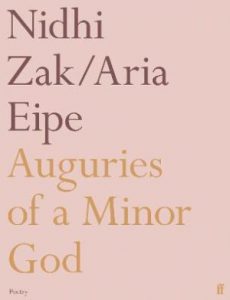 The debut collection of poetry from a virtuosic, compassionate new voice.
The debut collection of poetry from a virtuosic, compassionate new voice.
Nidhi Zak/Aria Eipe is a poet, pacifist and fabulist.
Born in India, she grew up across the Middle East, Europe and North America before calling Ireland home.
Founder of the Play It Forward Fellowships, she serves as poetry editor at Skein Press and Fallow Media, contributing editor for The Stinging Fly and an advisory board member of Ledbury Poetry Critics Ireland.
She is the recipient of a Next Generation Artist Award in Literature from the Arts Council of Ireland and the inaugural Ireland Chair of Poetry Student Award.
Nidhi Zak/Aria Eipe’s spellbinding debut poetry collection explores love and the wounds it makes. Its first half is composed of five sections, corresponding to the five arrows of Kama, the Hindu God of Love, Desire and Memory. Each arrow has its own effect on some body – a very real, contemporary body – and its particular journey of love.
The second is a long narrative poem, ‘A is for [Arabs]’, which follows a different kind of journey: a family of refugees who have fled to the West from conflict in an unspecified Middle Eastern country. With an extraordinary structure, yoking abecedarian and Fibonacci sequences, it is a skillful and intimate account of migration and exile, of home and belonging.
Auguries of a Minor God
by Nidhi Zak/Aria Eipe
Publisher: Faber & Faber
September 7, 2021
Language: English
Paperback: 120 pages
ISBN-10 : 0571365566
ISBN-13: 978-0571365562
£10.99
• fleursdumal.nl magazine
More in: #Modern Poetry Archive, - Book News, Archive E-F, Archive E-F, Archive Y-Z, Archive Y-Z
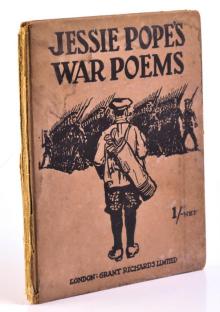
Love In A Mist
Beneath an Ilfracombe machine,
While thunderstorms were raging,
Strephon and Chloe found the scene
Exceedingly engaging;
Though Mother Earth reproached the skies
With flinging pailfuls at her,
When Strephon looked in Chloe’s eyes
The weather didn’t matter.
When ‘Arry up on ‘Ampstead ‘Eath
Performed a double shuffle,
The rain above, the mud beneath,
His spirits failed to ruffle;
For ‘Arriet was by his side
In maddened mazes whirling
And little cared his promised bride
To see her plumes uncurling.
For one resplendent Summer morn
Young Edwin fondly waited,
Till Angelina grew forlorn
And quite emaciated.
When Hampton Court was like a sponge,
With mists their way beguiling,
He seized her hand and took the plunge,
And came up wet and smiling.
Jessie Pope
(1868 – 1941)
Love In A Mist
From: War Poems
• fleursdumal.nl magazine
More in: *War Poetry Archive, Archive O-P, Pope, Jessie, WAR & PEACE
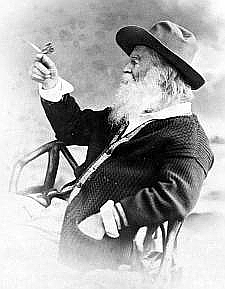
Cavalry Crossing a Ford
A line in long array where they wind betwixt green islands,
They take a serpentine course, their arms flash in the sun–hark to the musical clank,
Behold the silvery river, in it the splashing horses loitering stop to drink,
Behold the brown-faced men, each group, each person a picture, the negligent rest on the saddles,
Some emerge on the opposite bank, others are just entering the ford–while,
Scarlet and blue and snowy white,
The guidon flags flutter gayly in the wind.
Walt Whitman
(1819 – 1892)
Poem: Cavalry Crossing a Ford
• fleursdumal.nl magazine
More in: Archive W-X, Archive W-X, Whitman, Walt
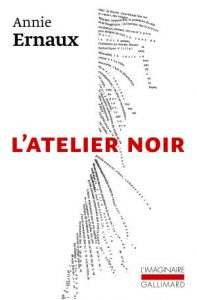 Tous les livres que j’ai écrits ont été précédés d’une phase, souvent très longue, de réflexions et d’interrogations, d’incertitudes et de directions abandonnées.
Tous les livres que j’ai écrits ont été précédés d’une phase, souvent très longue, de réflexions et d’interrogations, d’incertitudes et de directions abandonnées.
À partir de 1982, j’ai pris l’habitude de noter ce travail d’exploration sur des feuilles, avec des dates, et j’ai continué de le faire jusqu’à présent. C’est un journal de peine, de perpétuelle irrésolution entre des projets, entre des désirs. Une sorte d’atelier sans lumière et sans issue, dans lequel je tourne en rond à la recherche des outils, et des seuls, qui conviennent au livre que j’entrevois, au loin, dans la clarté.
A. E.
Parallèlement à ses romans, Annie Ernaux tient un journal d’avant-écriture ; une sorte de livre de fouilles, rédigé année après année, qui offre une incursion rare de « l’autre côté » de l’œuvre.
Plongé au cœur même de l’acte d’écrire, le lecteur devient témoin du long dialogue de l’autrice avec elle-même : la pensée taillée au couteau, des idées en vrac, des infinitifs en mouvement ; des associations de mots, de morceaux de temps, et de confidences.
Pour la réédition de L’atelier noir, Annie Ernaux a souhaité augmenter l’ouvrage de pages inédites de son journal de Mémoire de fille.
Annie Ernaux
L’atelier noir
Édition augmentée
Collection L’Imaginaire (n° 733), Gallimard
Parution: 10-02-2022 – Poche 10 €
180 pages, sous couverture illustrée, 125 x 190 mm
Achevé d’imprimer : 01-01-2022
Genre : Mémoires et autobiographies Catégorie – Littérature
Époque : XXe-XXIe siècle
ISBN : 9782072958441
• fleursdumal.nl magazine
More in: - Book News, - Book Stories, Archive E-F, Archive E-F
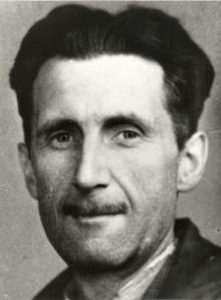
A Dressed Man
A dressed man and a naked man
Stood by the kip-house fire,
Watching the sooty cooking-pots
That bubble on the wire;
And bidding tanners up and down,
Bargaining for a deal,
Naked skin for empty skin,
Clothes against a meal.
‘Ten bob it is,’ the dressed man said,
‘These boots cost near a pound,
This coat’s a blanket of itself.
When you kip on the frosty ground.’
‘One dollar,’ said the nakd man,
‘And that’s a hog too dear;
I’ve seen a man strip off his shirt
For a fag and a pot of beer.’
‘Eight and a tanner,’ the dressed man said,
George Orwell
(1903 – 1950)
A Dressed Man
• fleursdumal.nl magazine
More in: Archive O-P, Archive O-P, George Orwell, Orwell, George

Death be Not Proud
Death be not proud, though some have called thee
Mighty and dreadfull, for, thou art not soe,
For, those, whom thou think’st, thou dost overthrow,
Die not, poore death, nor yet canst thou kill mee.
From rest and sleepe, which but thy pictures bee,
Much pleasure, then from thee, much more must flow,
And soonest our best men with thee doe goe,
Rest of their bones, and soules deliverie.
Thou art slave to Fate, Chance, kings, and desperate men,
And dost with poyson, warre, and sicknesse dwell,
And poppie, or charmes can make us sleepe as well,
And better then thy stroake; why swell’st thou then?
One short sleepe past, wee wake eternally,
And death shall be no more; death, thou shalt die.
John Donne
(1572 – 1631)
Death be Not Proud
(±1618)
• fleursdumal.nl magazine
More in: Archive C-D, Archive C-D, Donne, John
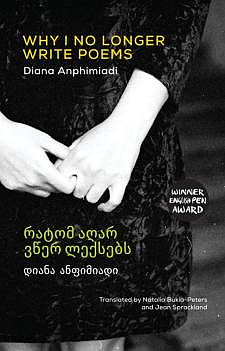 Diana Anphimiadi is a poet, publicist, linguist and teacher. She has published four collections of poetry in Georgian: Shokoladi (Chocolate, 2008), Konspecturi Mitologia (Resumé of Mythology, 2009), Alhlokhedvis Traektoria (Trajectory of the Short-Sighted, 2012) and Chrdilis Amoch’ra (Cutting the Shadow, 2015).
Diana Anphimiadi is a poet, publicist, linguist and teacher. She has published four collections of poetry in Georgian: Shokoladi (Chocolate, 2008), Konspecturi Mitologia (Resumé of Mythology, 2009), Alhlokhedvis Traektoria (Trajectory of the Short-Sighted, 2012) and Chrdilis Amoch’ra (Cutting the Shadow, 2015).
Her poetry has received prestigious awards, including first prize in the 2008 Tsero (Crane Award) and the Saba Prize for the best first collection in 2009. Her chapbook, Beginning to Speak, was published in 2018 by the Poetry Translation Centre, and Why I No Longer Write Poems, the first full-length Georgian-English selection of her poetry, is published by Bloodaxe Books with the Poetry Translation Centre in 2022, both titles translated by Natalia Bukia-Peters and Jean Sprackland.
Diana Anphimiadi lives in Tblisi with her son.
The poems in this selection have been collaboratively translated into English by the leading Georgian translator Natalia Bukia-Peters and award-winning British poet Jean Sprackland. A chapbook selection of their translations of Anphimiadi’s work, Beginning to Speak, was published in 2018 and praised by Adham Smart in Modern Poetry in Translation for capturing the ‘electricity of Anphimiadi’s language’ which ‘crackles from one poem to the next in Bukia-Peters and Sprackland’s fine translation’.
#new poetry
Diana Anphimiadi
Why I No Longer Write Poems
Translated by Jean Sprackland & Natalia Bukia-Peters
Publication Date : 24 Feb 2022
Winner English PEN Award
Paperback
Pages: 160
Size: 216 x 138mm
Bloodaxe Books Ltd
ISBN: 9781780375472
£12.99
• fleursdumal.nl magazine
More in: #Editors Choice Archiv, - Book News, - Bookstores, Archive A-B, Archive A-B, Jean Genet
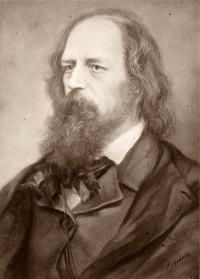
Maud
Come into the garden, Maud,
For the black bat, Night, has flown,
Come into the garden, Maud,
I am here at the gate alone;
And the woodbine spices are wafted abroad,
And the musk of the roses blown.
For a breeze of morning moves,
And the planet of Love is on high,
Beginning to faint in the light that she loves
On a bed of daffodil sky,
To faint in the light of the sun she loves,
To faint in his light, and to die.
All night have the roses heard
The flute, violin, bassoon;
All night has the casement jessamine stirr’d
To the dancers dancing in tune;
Till a silence fell with the waking bird,
And a hush with the setting moon.
I said to the lily, ‘There is but one
With whom she has heart to be gay.
When will the dancers leave her alone?
She is weary of dance and play.’
Now half to the setting moon are gone,
And half to the rising day;
Low on the sand and loud on the stone
The last wheel echoes away.
I said to the rose, ‘The brief night goes
In babble and revel and wine.
O young lord-lover, what sighs are those
For one that will never be thine?
But mine, but mine,’ so I sware to the rose,
‘For ever and ever, mine.’
And the soul of the rose went into my blood,
As the music clash’d in the hall;
And long by the garden lake I stood,
For I heard your rivulet fall
From the lake to the meadow and on to the wood,
Our wood, that is dearer than all;
From the meadow your walks have left so sweet
That whenever a March-wind sighs
He sets the jewel-print of your feet
In violets blue as your eyes,
To the woody hollows in which we meet
And the valleys of Paradise.
The slender acacia would not shake
One long milk-bloom on the tree;
The white lake-blossom fell into the lake,
As the pimpernel dozed on the lea;
But the rose was awake all night for your sake,
Knowing your promise to me;
The lilies and roses were all awake,
They sigh’d for the dawn and thee.
Queen rose of the rosebud garden of girls,
Come hither, the dances are done,
In gloss of satin and glimmer of pearls,
Queen lily and rose in one;
Shine out, little head, sunning over with curls.
To the flowers, and be their sun.
There has fallen a splendid tear
From the passion-flower at the gate.
She is coming, my dove, my dear;
She is coming, my life, my fate;
The red rose cries, ‘She is near, she is near;’
And the white rose weeps, ‘She is late;’
The larkspur listens, ‘I hear, I hear;’
And the lily whispers, ‘I wait.’
She is coming, my own, my sweet;
Were it ever so airy a tread,
My heart would hear her and beat,
Were it earth in an earthy bed;
My dust would hear her and beat,
Had I lain for a century dead;
Would start and tremble under her feet,
And blossom in purple and red.
Alfred Lord Tennyson
(1809 – 1892)
Maud
Published in 1855.
• fleursdumal.nl magazine
More in: Archive S-T, Archive S-T, Tennyson, Alfred Lord
Marina Keegan (1989-2012) was an award-winning author, journalist, playwright, poet, actress, and activist.
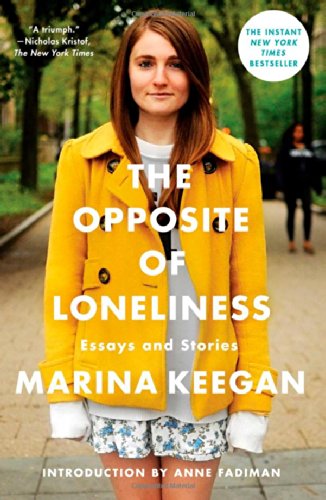
Her nonfiction has been published in The New York Times; her fiction has been published on NewYorker.com, and read on NPR’s Selected Shorts; her musical, Independents, was a New York Times Critics’ Pick. Marina’s final essay for The Yale Daily News, “The Opposite of Loneliness”, became an instant global sensation, viewed by more than 1.4 million people from 98 countries.
‘A generation-defining collection published posthumously…Her voice is relevant, sharp, fresh, unfiltered and poetic, with a dry wit. You can dive in and out of her questioning and her musings and meanderings. So much promise’, Jenna Coleman, star of Doctor Who and Victoria.
Marina Keegan’s star was on the rise when she graduated from Yale in May 2012. She had a play that was to be produced at the New York International Fringe Festival and a job waiting for her at the New Yorker. Tragically, five days after graduation, Marina died in a car crash.
As her family, friends and classmates, deep in grief, joined to create a memorial service for Marina, her unforgettable last essay for the Yale Daily News, ‘The Opposite of Loneliness’, went viral, receiving more than 1.4 million hits.
She had struck a chord. Even though she was just 22 when she died, Marina left behind a rich, expansive trove of prose that, like her title essay, captures the hope, uncertainty and possibility of her generation. The Opposite of Loneliness is an assemblage of Marina’s essays and stories that articulates the universal struggle we all face as we work out what we aspire to be and how we can harness our talents to make an impact on the world.
The Opposite of Loneliness:
Essays and Stories
by Marina Keegan (Author),
Anne Fadiman (Introduction)
Publisher: Scribner,
Simon & Schuster Ltd
First Edition (April 8, 2014)
Language: English
240 pages
ISBN-10 : 147675361X
ISBN-13 : 978-1476753614
Price: Paperback € 19,99
Marina Keegan (1989-2012)
American author, playwright, journalist, actress and poet
Born: Marina Evelyn Keegan
October 25, 1989
Boston, Massachusetts
Died: May 26, 2012 (aged 22)
Cape Cod (USA)
Alma mater; Yale University
The Opposite of Loneliness:
Essays and Stories (2014)
American literature
For more information, visit: TheOppositeofLoneliness.com
• fleursdumal.nl magazine
More in: #Biography Archives, #Editors Choice Archiv, - Book News, Archive K-L, Archive K-L, In Memoriam, Marina Keegan, THEATRE
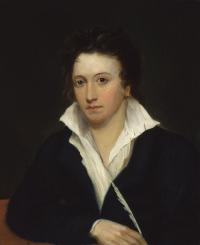
Love’s Philosophy
The fountains mingle with the river
And the rivers with the Ocean,
The winds of Heaven mix for ever
With a sweet emotion;
Nothing in the world is single;
All things by a law divine
in one spirit meet and mingle.
Why not I with thine?-
See the mountains kiss high Heaven
And the waves clasp one another;
No sister-flower would be forgiven
If it disdained its brother;
And the sunlight clasps the earth
And the moonbeams kiss the sea:
What is all this sweet work worth
If thou kiss not me?
Percy Bysshe Shelley
(1792 – 1822)
Love’s Philosophy
• fleursdumal.nl magazine
More in: Archive S-T, Archive S-T, Shelley, Percy Byssche
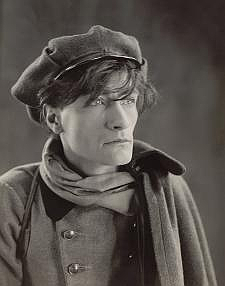
Poème Révolte contre la poésie
Nous n’avons jamais écrit qu’avec la mise en incarnation de l’âme,
mais elle était déjà faite, et pas par nous-mêmes,
quand nous sommes entrés dans la poésie.
Le poète qui écrit s’adresse au Verbe et le Verbe a ses lois.
Il est dans l’inconscient du poète de croire automatiquement à ces lois.
Il se croit libre et il ne l’est pas.
Antonin Artaud
(1896 – 1948)
Poème Révolte contre la poésie
• fleursdumal.nl magazine
More in: Antonin Artaud, Archive A-B, Archive A-B, Artaud, Antonin
Thank you for reading Fleurs du Mal - magazine for art & literature